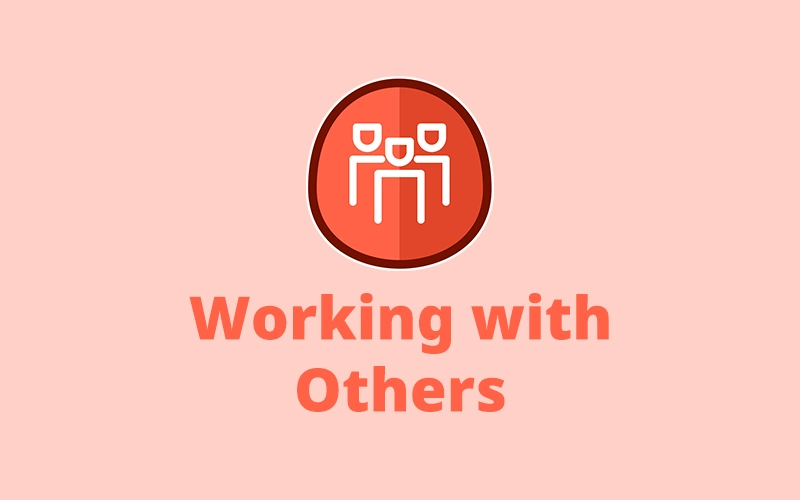In the professional landscape, your individual talents are valuable, but your ability to collaborate effectively and build strong working relationships is often the key to unlocking collective success and long-term career growth. This post, part of our career skills series, delves into the art of teamwork, understanding diverse personalities, and navigating workplace relationships with professionalism.
Why Working with Others Matters
Few accomplishments in the workplace are achieved in complete isolation. Whether you’re part of a project team, interacting with clients, or collaborating with colleagues, your ability to work harmoniously with others significantly impacts productivity, innovation, and overall workplace satisfaction.
Strong Skills in Working with Others Benefit Individuals by:
- Enhanced Productivity and Innovation: Collaborative environments foster the exchange of ideas, diverse perspectives, and shared problem-solving, leading to better outcomes.
- Improved Job Satisfaction: Positive workplace relationships create a more supportive and enjoyable work environment, boosting morale and reducing stress.
- Increased Opportunities for Growth: Demonstrating strong teamwork and interpersonal skills often leads to more opportunities for leadership and involvement in key projects.
- Stronger Professional Network: Building positive relationships expands your network, providing valuable connections for support, mentorship, and future career opportunities.
For Organisations, Employees Skilled in Working with Others Translate to:
- More Cohesive and Effective Teams: Teams that work well together are more productive, efficient, and better equipped to achieve common goals.
- Reduced Conflict and Improved Communication: Understanding different personalities and fostering open communication minimises misunderstandings and promotes a positive work environment.
- Enhanced Organisational Culture: A workplace where collaboration and respect are valued fosters a positive and inclusive culture, attracting and retaining top talent.
- Increased Innovation and Problem-Solving: Diverse teams with strong interpersonal skills are better at generating creative solutions and navigating complex challenges.
Key Elements of Working with Others
- Mastering Teamwork
- Active Contribution: Participating fully in team discussions, sharing your ideas, and taking ownership of your responsibilities.
Practice: In your next team meeting, make a conscious effort to contribute at least one thoughtful idea or suggestion. Volunteer for tasks that align with your skills and interests. - Effective Communication within a Team: Clearly articulating your thoughts, actively listening to others, and providing constructive feedback.
Practice: When communicating with your team, be mindful of clarity and conciseness. Practice active listening by summarising what others have said to ensure understanding. Frame feedback in a positive and helpful way. - Shared Goal Orientation: Focusing on the team’s objectives and aligning your individual efforts with those goals.
Practice: Research common keywords used in your industry and include them naturally in your CV.
- Active Contribution: Participating fully in team discussions, sharing your ideas, and taking ownership of your responsibilities.
- Understanding Different Personalities
- Recognising Personality Types: Developing an awareness of different personality frameworks (e.g., Myers-Briggs, DISC) to better understand individual preferences and working styles.
Practice: Research basic personality frameworks and try to identify different personality traits among your colleagues. Observe how different people approach tasks and interactions. - Adapting Your Communication Style: Adjusting your communication approach to suit the personality and preferences of the person you are interacting with.
Practice: Pay attention to how your colleagues prefer to communicate (e.g., direct vs. indirect, written vs. verbal). Try mirroring their communication style to build rapport. - Empathy and Perspective-Taking: Trying to understand situations from another person’s point of view and acknowledging their feelings and perspectives.
Practice: When disagreements arise, actively try to see the situation from your colleague’s perspective. Ask clarifying questions to understand their reasoning and acknowledge their feelings.
- Recognising Personality Types: Developing an awareness of different personality frameworks (e.g., Myers-Briggs, DISC) to better understand individual preferences and working styles.
- Handling Workplace Relationships Professionally
- Building Rapport and Trust: Establishing positive connections with colleagues based on mutual respect, reliability, and open communication.
Practice: Take the time to get to know your colleagues on a professional level. Be reliable in your commitments and communicate honestly and transparently. - Navigating Conflict Constructively: Addressing disagreements and conflicts in a calm, respectful, and solution-oriented manner.
Practice: When faced with conflict, focus on the issue rather than personal attacks. Practice active listening to understand all sides of the argument and work collaboratively towards a resolution. - Setting and Respecting Boundaries: Establishing clear professional boundaries and respecting the boundaries of others to maintain healthy working relationships.
Practice: Be clear about your availability and workload. Respect your colleagues’ time and personal space. Avoid oversharing personal information in professional settings. - Providing and Receiving Feedback Professionally: Delivering constructive feedback in a tactful and helpful manner, and being open to receiving feedback for your own development.
Practice: When giving feedback, focus on specific behaviours and their impact. Frame feedback positively and offer suggestions for improvement. When receiving feedback, listen attentively and ask clarifying questions.
- Building Rapport and Trust: Establishing positive connections with colleagues based on mutual respect, reliability, and open communication.
Mastering the art of working with others is a continuous journey that requires self-awareness, empathy, and a commitment to professional conduct. By developing these crucial skills, you’ll not only contribute to more successful teams and projects but also cultivate a more fulfilling and rewarding long-term career.
In our next post, we’ll lay the groundwork for “Business Basics,” helping you understand how workplaces function and grasp essential business concepts.
Stay Connected: Subscribe to our newsletter and follow us on social media to get notified when new content is published. We’d love to hear from you! Share your thoughts and experiences in the comments below.

